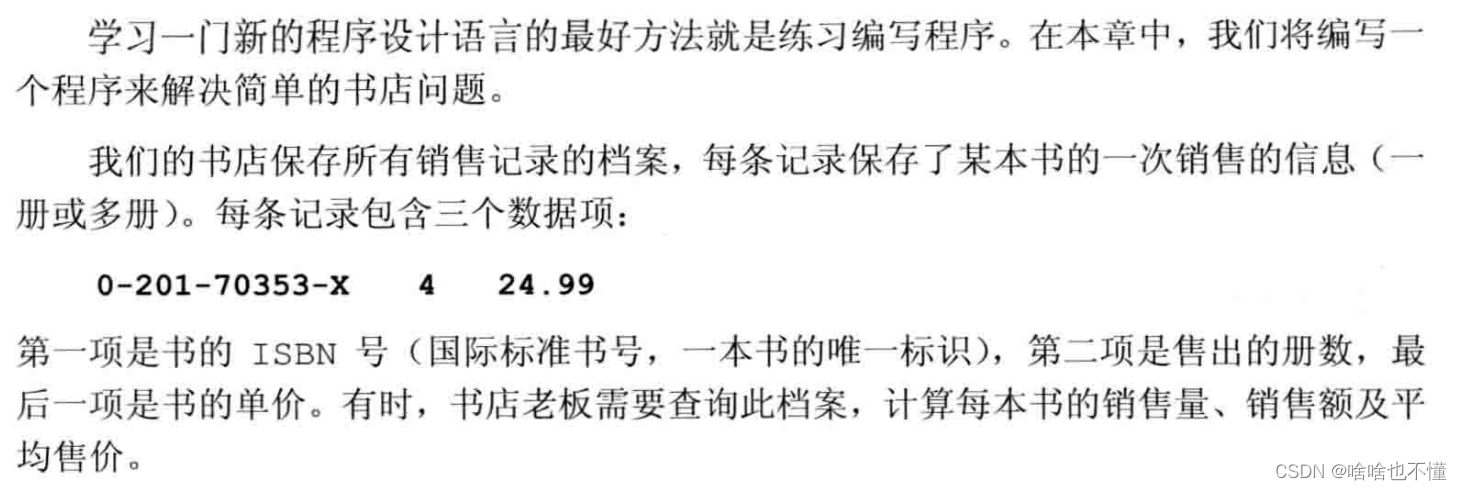在本章的开头,作者给大家留了一个任务
我们要先解决一个问题,什么样的数据类型才能存储每条记录呢。C++中,我们通过定义一个类(class)来定义自己的数据结构。一个类定义一个类型,以及与其关联的的一组操作。C++最初的一个设计焦点就是能定义使用上像内置类型(int float .....)一样自然的类类型(class type)

?这是c ++ primer plus里面的类的介绍。最重要的一句:类描述了一种数据类型的全部属性(包括可使用它执行的操作),对象是根据这些描述创建的实体。
我们将Sales_item.h加入头文件中

?
以下是Sales_item.h的源码。我也不懂,整上以后再说。
/*
* This file contains code from "C++ Primer, Fifth Edition", by Stanley B.
* Lippman, Josee Lajoie, and Barbara E. Moo, and is covered under the
* copyright and warranty notices given in that book:
*
* "Copyright (c) 2013 by Objectwrite, Inc., Josee Lajoie, and Barbara E. Moo."
*
*
* "The authors and publisher have taken care in the preparation of this book,
* but make no expressed or implied warranty of any kind and assume no
* responsibility for errors or omissions. No liability is assumed for
* incidental or consequential damages in connection with or arising out of the
* use of the information or programs contained herein."
*
* Permission is granted for this code to be used for educational purposes in
* association with the book, given proper citation if and when posted or
* reproduced.Any commercial use of this code requires the explicit written
* permission of the publisher, Addison-Wesley Professional, a division of
* Pearson Education, Inc. Send your request for permission, stating clearly
* what code you would like to use, and in what specific way, to the following
* address:
*
* Pearson Education, Inc.
* Rights and Permissions Department
* One Lake Street
* Upper Saddle River, NJ 07458
* Fax: (201) 236-3290
*/
/* This file defines the Sales_item class used in chapter 1.
* The code used in this file will be explained in
* Chapter 7 (Classes) and Chapter 14 (Overloaded Operators)
* Readers shouldn't try to understand the code in this file
* until they have read those chapters.
*/
#ifndef SALESITEM_H
// we're here only if SALESITEM_H has not yet been defined
#define SALESITEM_H
// Definition of Sales_item class and related functions goes here
#include <iostream>
#include <string>
class Sales_item {
// these declarations are explained section 7.2.1, p. 270
// and in chapter 14, pages 557, 558, 561
friend std::istream& operator>>(std::istream&, Sales_item&);
friend std::ostream& operator<<(std::ostream&, const Sales_item&);
friend bool operator<(const Sales_item&, const Sales_item&);
friend bool
operator==(const Sales_item&, const Sales_item&);
public:
// constructors are explained in section 7.1.4, pages 262 - 265
// default constructor needed to initialize members of built-in type
Sales_item() = default;
Sales_item(const std::string& book) : bookNo(book) { }
Sales_item(std::istream& is) { is >> *this; }
public:
// operations on Sales_item objects
// member binary operator: left-hand operand bound to implicit this pointer
Sales_item& operator+=(const Sales_item&);
// operations on Sales_item objects
std::string isbn() const { return bookNo; }
double avg_price() const;
// private members as before
private:
std::string bookNo; // implicitly initialized to the empty string
unsigned units_sold = 0; // explicitly initialized
double revenue = 0.0;
};
// used in chapter 10
inline
bool compareIsbn(const Sales_item& lhs, const Sales_item& rhs)
{
return lhs.isbn() == rhs.isbn();
}
// nonmember binary operator: must declare a parameter for each operand
Sales_item operator+(const Sales_item&, const Sales_item&);
inline bool
operator==(const Sales_item& lhs, const Sales_item& rhs)
{
// must be made a friend of Sales_item
return lhs.units_sold == rhs.units_sold &&
lhs.revenue == rhs.revenue &&
lhs.isbn() == rhs.isbn();
}
inline bool
operator!=(const Sales_item& lhs, const Sales_item& rhs)
{
return !(lhs == rhs); // != defined in terms of operator==
}
// assumes that both objects refer to the same ISBN
Sales_item& Sales_item::operator+=(const Sales_item& rhs)
{
units_sold += rhs.units_sold;
revenue += rhs.revenue;
return *this;
}
// assumes that both objects refer to the same ISBN
Sales_item
operator+(const Sales_item& lhs, const Sales_item& rhs)
{
Sales_item ret(lhs); // copy (|lhs|) into a local object that we'll return
ret += rhs; // add in the contents of (|rhs|)
return ret; // return (|ret|) by value
}
std::istream&
operator>>(std::istream& in, Sales_item& s)
{
double price;
in >> s.bookNo >> s.units_sold >> price;
// check that the inputs succeeded
if (in)
s.revenue = s.units_sold * price;
else
s = Sales_item(); // input failed: reset object to default state
return in;
}
std::ostream&
operator<<(std::ostream& out, const Sales_item& s)
{
out << s.isbn() << " " << s.units_sold << " "
<< s.revenue << " " << s.avg_price();
return out;
}
double Sales_item::avg_price() const
{
if (units_sold)
return revenue / units_sold;
else
return 0;
}
#endif
#include<iostream>
#include "Sales_item.h"
int main() {
Sales_item item1, item2;
std::cin >> item1 >> item2;
std::cout << item1 + item2 << std::endl;
}

#include<iostream>
#include "Sales_item.h"
int main() {
Sales_item total,trans;
std::cout << "请输入几条ISBN相同的销售记录" << std::endl;
if (std::cin >> total) {
while (std::cin >> trans) {
if (total.isbn() == trans.isbn()) {
total = total + trans;
}
else {
std::cerr << "输入的销售记录的ISBN不一致" << std::endl;
}
}
std::cout << "汇总数据为"
<< total
<< std::endl;
}
else {
std::cout << "没有数据";
return -1;
}
}
?遇到一个问题
#include<iostream>
#include "Sales_item.h"
int main() {
Sales_item total,trans;
while (std::cin >> trans) {
total += trans;
}
std::cout << total;
}
我没有给total赋值,而是直接让它和trans相加,为什么这里不行呢,isbn没有了。给自己留个问题。。
1.5.2初识成员函数
首先看一段代码,这段代码的功能是检查两个对象是否具有相同的ISBN。
#include<iostream>
#include "Sales_item.h"
int main() {
Sales_item item1, item2;
std::cin >> item1 >> item2;
//首先检查item1和item2是否表示相同的书
if (item1.isbn() == item2.isbn()) {
std::cout << item1 + item2 << std::endl;
return 0; //表示成功
}
else
{
std::cerr << "Date must refer to same ISBN"
<< std::endl;
return -1; //表示失败
}
}我们看这个if语句的检测条件:item1.isbn() == item2.isbn()
意思就是调用名为isbn的成员函数(member function)。成员函数是定义为 类的一部分 的函数,有时也被称为方法(method)。我们通常以一个类对象的名义来调用成员函数。
item1.isbn() 使用点运算符. 来表达我们需要的“名为item1的对象的isbn成员。”点运算符只能用于类 类型的对象。其左侧运算对象必须是一个类 类型的对象,右侧必须是该类型的一个成员名,而最终的运算结果为右侧运算对象指定的成员。

?

